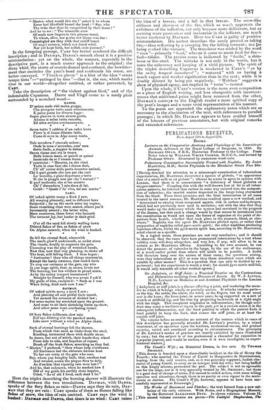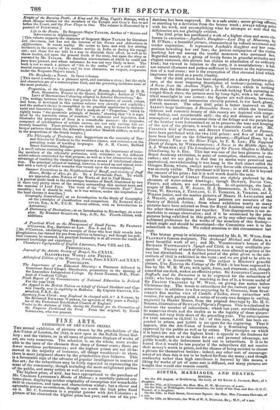PUBLICATIONS RECEIVED,
From August llth to August 17th. BOOKS.
Lectures on the Comparative Anatomy and Physiology of the Invertebrate Animals, delivered at the Royal College of Surgeons, in 1843. By RICHARD OwErs, F.R.S., Hunterian Professor to the College. From Notes taken by WILLIAM WRITE COOPER, M.R.C.S., and revised by Professor OwEe. Illustrated by numerous woodcuts.
Pulmonary Consumption Successfully Treated with Naphtha. By JOHN HASTINGS, M.D., Senior Physician to the Blenheim Street Free Dis- pensary.
[Having directed his attention to a microscopic examination of tuberculous
expectoration, Dr. HASTINGS discovered a species of globule, " in appearance that of a small milk or oil globule"; whence he seems to agree in opinion with lama, that there is in consumption " a deficiency of blood globules or oxygen-carriers." Coupling this with the well-known loss of fat in all tuber- culous patients, he inferred that carbon in some way entered into the composi• tion of tubercles ; the morbid matter deposited in the lungs being abstracted from the blood. From these premises, and the fatal termination of all cases treated in the usual manner, Dr. HASTINGS resolved upon a new method, and " determined to employ these compound agents, rich in carbon and hydrogen, which had not previously been used in medicine; not with the idea that they would make up the deficiency which the system had sustained in the progress of the disease, but that such a change would by that means be introduced into the constitution as would act upon the forces of organism at the point of de- parture from health, whether that took place in the stomach, blood, or else- where." Naphtha was the agent Dr. HASTINGS pitcbed upon, or rather that preparation of naphtha called pyro-acetic spirit; the other naphthas producing injurious effects, whilst the pyro-acetic spirit has, according to Dr. Hotcrusos, acted almost as a specific. In a logical sense, these premises are not very conclusive; and it should
be observed, that the cases have been pronounced tuberculous by a test whose validity some will deny altogether, and very few, if any, will allow to be so certain as Dr. HASTINGS affirms. According to his own account, he can detect the presence of tubercles in the lungs, by the use of the stethoscope, at a much earlier period than others will admit to be possible. A doubt will therefore hang over the nature of these cases; the questions arising, were they tuberculous at all ? or were they those simulated cases which are curable by other means ? This is a question that can only be decided by ex- periment; but the experiment is worth a trial; for should pyro-acetic acid fail, it would only resemble all other medical agents.]
On Anhylosis, or Stiff Joint : a Practical Treatise on the Contractions and Deformities resulting from Diseases of Joints. By W. J. LITTLE, M.D., Lecturer on Mediciuc at and Assistant Physician to the London Hospital, &c. [Ankylosis, or stiff joint, is a disease affecting a joint, and rendering the mem- ber to whicb it belongs wholly or partially useless. It attacks various parts—
as the hip, the ankle, the elbow, the wrist, or the fingers, but its most usual
seat is the knee; the knee-joint, in severe cases, being supported on a sort of crutch or artificial leg, and the true leg projecting backwards at a right angle with the thigh. This complaint originates in inflammation; for though acci- dent may cause a mechanical injury to the part, yet in a certain sense It is the subsequent inflammation, and the fixed position in which the patient finds it least painful to keep the limb, that causes the stiff joint, or at least the curable stiff joint.
The volume before us contains an account of the success which in cases of this description has generally attended Dr. LITTLE'S practice, by a mixed
treatment, of an operation upon the tendons, mechanical means, and gradual exercise, varied and combined according to circumstances. The principles of Dr. LrrTLE's modes of practice are mostly exhibited by cases illustrated by cuts ; but the subject is of too professional a character for exposition in a popular journal, and would be useless, even if it were intelligible, to unpro- fessional readers.]
The Cond'es Wife ; an Historical Drama, in five acts. By THOMAS SEIBERT.
[This drama is founded upon a discreditable incident in the life of Henry the Fourth ; who married the Prince of Conde to Margueritte de Moutmorenci, hoping, from the cold reserve, and, as it was generally supposed, foolish cha- racter of young Conde, to carry on an intrigue with his wife; but being baffled in this kingly scheme, persecuted the pair. The subject is not an agreeable one for the stage, nor is it very agreeably treated by Mr. SEIBERT; but there is a good deal of change of scene, if it cannot be called action, with some telling speeches and situations, though there is no poetry or even vigour in the senti- ments or diction. The Comdex Wife, however, appears to have been suc- cessfully represented at Edinburgh.] The Works of Beaumont and Fletcher; the text formed from a new col.' teflon of the early editions. With Notes, and a Biographical Memoiri: by the Reverend ALEXANDER DICE. In eleven volumes. Volume IL' [This second volume contains six pieces—The faidy'ul Shepherdess, The Knight of the Bunting Pestle, A King and No King, Cupid's Revenge, with a short Ira written for the members of the Temple and Gray s inn to act before the Court, and the Four Plays in One. The volume is illustrated by a portrait of FLETCHER.] Life in the Ranks. By Sergeant-Major TAYLOR, Author of " Scenes and Adventures in Afghanistan."
[This volume supports the character of Sergeant.Major TAYLOR for literature and cleverness, but has not the interest of his Scenes and Adventures in Afghanistan. It wants reality. He seems to have met with few stirring incidents in the course of his routine service in India or during his voyage out ; and those few are told in a way to diminish their effect, as well as to throw doubts, not upon the general truth of the story, but upon the story as narrated by Mr. TAYLOR. He describes conversations at which he could not have been present, and whose substance he was not very likely to bear. The book is not so much a picture of "life in the ranks," as of a sort of senti- mental romance in tl.e ranks ; and its true character, we suspect, evaporates under the Sergeant-Major's touch.] The Busybody; a Novel. In three volumes.
[This novel is written in a pleasant spirit, and contains a story; but the style and characters are of a commonplace kind, and the governing incidents none of the most probable.] Proportion, or the Geometric Principle of Beauty Analysed. By D. R.
RAY, Decorative Painter to the Queen, Edinburgh; Author of "The
Laws of Harmonious Colouring adapted to Interior Decorations," &c. [The analogy between the laws that govern the harmonies of sound, colour, and form, is developed in this curious volume very cleverly and explicitly ; and the author's theory is exemplified in its practical application to architec- tural and decorative design. Mr. HAT's analysis of " Proportion," which he rightly terms " the geometric principle of beauty," showing that " it is regu- lated by the harmonic ratios of numbers," is elaborate and ingenious, and illustrates the properties of lines in a remarkable manner : the diagrams, composed of combinations of certain curves, are not only curious but ex- tremely beautiful. These principles, we doubt not, may be traced in the ara- besque patterns that adorn the Alhambra and other Moorish edifices, as well as in the proportions of the Greek temples.] The Philosophy of Training; with Suggestions on the necessity of Nor. mal Schools for Teachers to the wealthier classes, and strictures on the prevailing mode of teaching languages. By A. R. CRAIG, Bedford Street Institution, Islington. [A small volume containing some general remarks on the importance of train- ing members of the scholastic profession, with criticisms on the different model-schools established for that purpose, as well as a few observations on the advantage of teaching the classical languages as a means of intellectual educa- tion. The principal subject of training, however, is mixed up and almost over- laid with a variety of other remarks that trench upon the commonplace.] Summer Excursions in the Neighbourhood of Banff, and vicinity of Duff House, Bridge of Alva, 6-c. ?cc. By a Deveronside Poet. To which are appended, some Notices of the Works of Art in Duff House. [A poetical guide-book to the picturesque beauties of Banff, illustrated by two or three very pretty views of the scenery surrounding this ancient town and the mansion of Lord FIFE. The verse of the "Deveronside Poet" flows smoothly ; but it should be read, as it was written, under the inspiration of the local charms it describes.] Geography Generalized; or an Introduction to the Study of Geography on the principles of classification and comparison. By ROBERT Son- LI-vs./4, Esq., A.M., T.C.D. Second edition, with an Introduction to Astronomy. A Dictionary of Derivations ; or an Introduction to Etymology, on anew plan. By ROBERT SULLIVAN, Esq., A.M., &c. Fourth edition, with additions.
SERIALS.
A Practical Work on the Management of Small Farms. By FEARGUS O'CoNNOR, Esq., Barrister-at-Law. Nos. L and II. [Mr. O'Connon, emulating the example of those who beat their swords into ploughshares, has turned his pen from politics to farming; and though his poli- tical economy be unsound, his practical husbandry is at all events the result of personal knowledge and experience.] Chambers's Cyclopedia of English Literature, Parts VIII. and IX.
PERIODICALS.
Journal of the Asiatic Society of Bengal, No. CXXIX. ILLUSTRATED WORKS AND PRINTS.
Abbotsford Edition of the Waverley Novels, Parts XXXIV. and XXXV.
PAMPHLETS.
The Importance of an Educated Ministry: a Discourse delivered in Grosvenor Street Chapel, Manchester, preparatory to the opening of the Lancashire Independent College. By JOHN HARRLs, D.D., Presi- dent of Cbeahunt College. Ninth Report of the Commissioners of National Education in Ireland. For the year 1842. An Appeal to the British Nation on behalf of Colonel Stoddart and Cap- tain Conolly, now in captivity in Bokhara. By Captain GRoVER, Un- attached, F.R.S., &c.
Apostasy from Christ : may England be charged with it? A Sermon, by the Reverend RICHARD WARNER, for upwards of fifty years a Presby- ter of the Protestant Established Church of England_ Venice in the Autumn of 1838, during the Festival for the Coronation of the Emperor Ferdinand the First. From the original, by Baron GIORDANO, who was present.



























 Previous page
Previous page